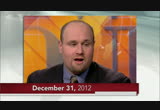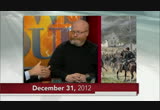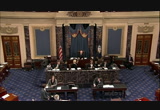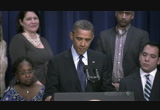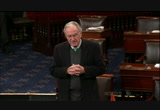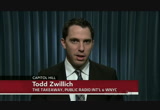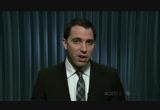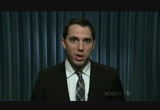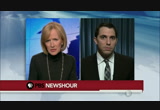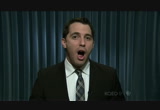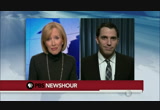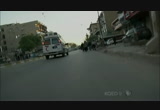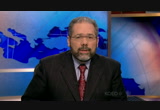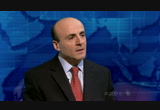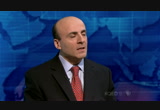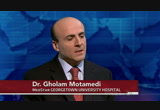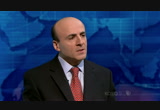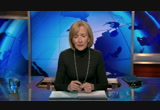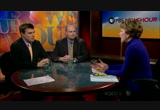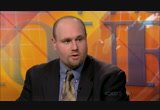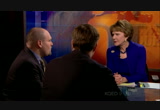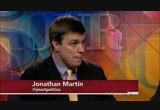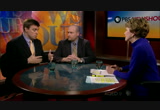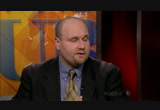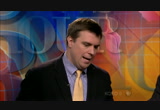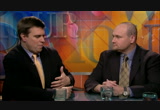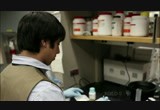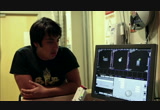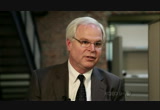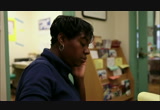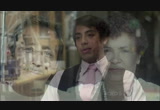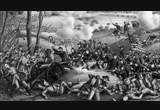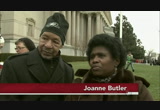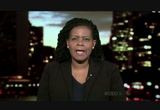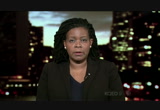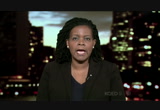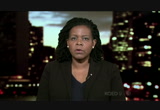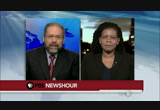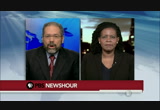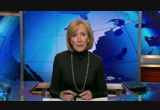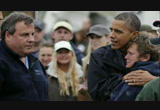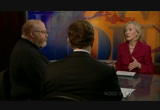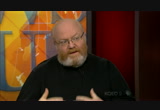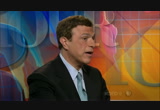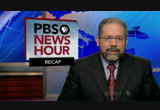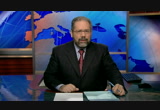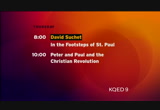tv PBS News Hour PBS December 31, 2012 3:00pm-4:00pm PST
3:00 pm
their new e-book focuses on the crucial final month of the presidential race between barack obama and mitt romney. test. >> barack obama didn't perform that well until late and romney didn't perform the campaign well. campaign management is more important than an individual candidate's performance. >> woodruff: from boston, hari sreenivasan reports on a city- wide effort to keep kids engaged in education through meaningful work experiences. >> we're starting at the very early ages to try to help young people speak. that is a direct relationship to being successful in school and being successful in your life >> woodruff: and we close out 2012 with two takes on history, first, a look at the emancipation proclamation on the eve of the 150th anniversary of president lincoln's action to end slavery and the civil war. >> woodruff: plus michael beschloss and richard norton smith talk about potential
3:01 pm
historical turning points of the past year. that's all ahead on tonight's newshour. moving our economy for 160 years. bnsf, the engine that connects us. >> and by the alfred p. sloan foundation. supporting science, technology, and improved economic performance and financial literacy in the 21st century. >> and with the ongoing support of these institutions and foundations. and... >> this program was made possible by the corporation for
3:02 pm
public broadcasting. and by contributions to your pbs station from viewers like you. thank you. >> woodruff: the old year ticked down today, and with it went any hope of meeting the midnight "fiscal cliff" deadline. house republicans opted not to hold any votes on the issue tonight. so-- officially, at least-- more than $600 million in tax hikes and spending cuts begin taking effect tomorrow. in the meantime, senate republicans and the white house continue working on a possible deal. . >> are running out of time. americans are still threatened with a tax hike in just a few hours. >> new year's eve morning at the capitol began with a warning from senate majority leader harry reid. after a long weekend dush -- weekend of tense negotiations vice president joe biden had spent sunday dealing directly with the senate's republican minority leader mitch mcconnell.
3:03 pm
and those contacts continued today. by early this afternoon amid reports of progress, president obama emerged in a campaign style setting. >> today it appears that an agreement to prevent this new year's tax hike is within sight. but it's to the done. there are still issues left to resolve. but we're hopeful that congress can get it done. but it's not done. >> it was widely reported that the deal would include making the bush era tax cuts permanent for families with incomes under $450,000 a year. for households making more than that amount, rates would rise from the current 35% to 39.6%. the agreement would also raise the estate tax. in addition, unemployment benefits would be extended for one year. otherwise some 2 million americans face the end of
3:04 pm
their benefits beginning in january. on the senate floor shortly before midafternoon, minority leader mcconnell confirmed that the stalemate on taxes appeared to be over. >> i can report that we've reached an agreement on all of the tax, the tax issues. we are very, very close. as the president just said, the most important piece, the piece that has to be done now is preventing the tax hikes. >> reporter: there was no a greenlt what to do about across-the-board spending cuts known as sequestration due to start tomorrow. democrats wanted to delay the cuts by a year. and the president served notice that even then he would insist on a balanced approach. >> now if republicans think that i will finish the job of deficit reduction through spending cuts alone, if they
3:05 pm
think that's gos to be the formula for how we solve this thing, then they've got another thing coming. that's not how it going to work. >> reporter: for his part senator mcconnell said that issue should not tan in the way of a tax deal. >> let's be clear, we'll continue to work on finding smarter ways to cut spending. but let's not let that hold up protecting americans from the tax hike that will take place in about ten hours. >> reporter: but other senate republicans brideeled at doing any deal now without substantial spending reductions. >> i just want to say i'm very disappointed with what the president had to say. i'm one senator. i just want to go on record, that is it's absolutely unacceptable to pay for this sequester with revenue. >> reporter: meantime there was growing grumbling in senate democratic ranks that vice president biden had given too much ground. >> as i see this thing developing, quite frankly, as i've said before, no deal is better than a bad deal.
3:06 pm
and this looks like a very bad deal the way this is shaping up. >> reporter: even the president acknowledged that he would have preferred a grand bargain on taxes and spending now. but he said -- >> with this congress, that was obviously a little too much to hope for at this time. >> reporter: as the day wore on and the bargaining continued, other key issues were hanging fire, including a one-year bill to prevent milk prices from doubling in the new year. joining us from the capitol joining us from the capitol with the very latest is todd zwillich. he's washington correspondent for "the takeaway" on public radio international and a regular guest on the newshour. so todd, you're back with us again. six hours to go until midnight. progress reported but still to deal. >> senate republicans, judy, the latest thing that has happened is senate republicans came out of a conference meeting with their leader, with mitch mcconnell all sounding positive. they all echoed what you had in the piece there from mcconnell saying they were very, very close to
3:07 pm
sequester the automatic spending cuts remain an outstanding issue. and kind of got thrown into the mix again today. you know, the president in that appearance in the executive office building today in front of a supportive crowd, not really a press conference, more of like a minirally, talked about the sequester and his desire to have any delay in the sequester paid for with revenue increases. you know, i talked to a few house members just a few moments ago. not only ot tone of the president's presentation, but also that demand which they consider move og the goalpost even though democrats dispute that on the issue of the sequester, a lot of them are really, really mad about it, judy. and they thought the president was twisting the knife, was goading them, was ridiculing them in front of the public. it made some of them, frankly, very, very angry. i was told how does that affect a deal in a practical sense. probably not much. but this sequester is, you know, it's a big part of the fiscal cliff.
3:08 pm
monetarily it's not quite half of it. it's worth $110 billion, and those spending cuts go into effect tonight. it's unclear if they are going to solve that part of it. >> woodruff: but todd s there, on the tax side, has there been agreement there, at least, on the senate side. because as we just reported some democrats say they don't like what they see. >> well, they don't need everybody. keep in mind, you-- what you need in the senate usually is 51 votes. we've gotten into this environment here where we assume that everything needs 60 votes. it doesn't have to be that way. you heard from senator harkin there, he and a bunch of other senate lib rarblingts shelton white house, al franken, jay rockefeller, other, huddled in harry reid's office earlier today. i was standing outside that room when they came out. they were tight-lipped. they were grim. they went into a side meeting all their own to try and decide what to do. they weren't talking when they came out. what you are looking for there is will they block this thing. will they slow it down. they haven't indicated that they will do that. they can vote against it as
3:09 pm
long as reid and mcconel can muster 51 vote force this thing. it appears if there are no procedural delay tactics which we can't afford that right now, they will be able to do that. that is the senate side. on the house side the question remains, this is a deal on the tax side that has no spending cuts. they're all very aware of that. can john boehner muster the votes on the house side to get this passed. republicans do not like this on the house side there are no spending cuts, so many of them say they will vote against it, maybe the question then becomes can john boehner muster 40 or 45 republican votes and then use the 185 or 190 votes that nancy pelosi would deliver, potentially for a deal like 24 with no spending cuts to pass it there, tomorrow or the next day. the house side is unclear at this point. >> woodruff: so todd, you're saying as we sit here this evening, we're hearing there may be a senate vote tonight, the house may vote tomorrow. but at this point, it still is not known the outlines of what a potential deal would
3:10 pm
look like. >> i think the outlines are known on the tax side. and it was described accurately in your piece there, judy, with the tax rates at 450 for families, dividends would go up, the estate tax part of it. what is important is the one year extension on unemployment benefits. there are 2 million people set to lose their benefits, so that is all in there. everybody must keep in mind that no matter what happens, even if you are under 450 or 250 as the president has been discussing, your taxes are going up tonight because the payroll tax holiday expires, that happens for everybody. they're not going to renew that holiday. so that is important to remember. on the tax side, they appear to be pretty much there. it a pores that the tax part of the cliff is going to be solved. and even if it is solve after new year's the treasury department can mess with the withholding rules so that your paycheck doesn't actually change. on the spending cut side, on the government sequester side, that is not solved, not clear that it will be. they may have to come back at that one. >> woodruff: so todd, at this point what you are watching as a reporter who
3:11 pm
has been covering this? the action is where? >> the action is in the senate democratic caucus. you're watching for a briefing that democrats want from the white house on the outlines of this deal. they want to lear from joe biden or one of his representatives. how did you arrive at this deal and what does it mean for us. you're watching for senators idea logical senators on both sides of this deal, liberals up set that the income threshold at 450, conservatives up set that there are no spending cuts in this deal t is all revenue. will somebody slow it down and block it. you have to watch it on the stat side because that pushes the senate over the cliff too. on the house side, once they're aware of what this deal is, how many votes can john boehner get on the republican side until you get to 218 through any combination of republican and democratic votes at this point. >> woodruff: not much celebrating tonight in the capitol. or at the capitol itself. todd zwillich, thank you very much. >> always a pleasure, judy. >> still to come on the newshour >> suarez: still to come on the newshour, causes and treatments
3:12 pm
for blood clots; a look back at the presidential race; building jobs skills while in high school; the emancipation proclamation; and 2012 in the history books. but first, the other news of the day. here's kwame holman. >> holman: wall street rallied on the final trading day of the year, hoping for a fiscal cliff deal. the dow jones industrial average gained 166 points to close at 13,104, up 7% for the year. the nasdaq rose 59 points to close at 3019, up nearly 16% this year. nearly two dozen people died in a string of attacks across iraq today. most of the violence targeted shiite communities and police. one of the blasts rocked baghdad's karrada neighborhood, sending smoke billowing above the skyline. the car bomb went off near a tent where shiite pilgrims were gathering. five people were killed there. in syria, elite troops, along with tanks, battled to dislodge rebels from a key southern suburb of damascus.
3:13 pm
the area is within firing distance of major government sites in the capital. amateur video also showed the aftermath of what appeared to be air strikes in the northeastern suburb of douma. the attacks toppled buildings and sent civilians fleeing. celebrations began today as the new year, 2013, dawned around the globe. we have a report from richard pallot of independent television news. . >> here we go! >> reporter: a perfect summer's night ushering in 2013 in sydney. 7 tons of fireworks lighting up the famous harbor, the world's biggest and most expensive. >> an emotional commentary accompanied the scene in the north korea capitol pyongyang, reportedly the first ever fireworks display in this secretive country.
3:14 pm
>> in shanghai in china they sang an alternative version of auld lang syne. >> and in hong kong a more familiar one. ♪ auld lang syne ♪. >> a sum >> holman: a somber mood prevailed across india on new year's eve, as the country mourned the victim of a gang rape. celebrations were scaled back after the 23-year-old woman died on saturday at a hospital in singapore. the attack on her has triggered mass protests in india. today, amid candlelight vigils, there were more calls for tougher rape laws. . >> we have all decide tad that we will not sell brat new years because this year we have lost a sister from amongst us. and whenever we lose someone of our own, or that person passes away we mourn for them. this time we are spending new year's in mourning >> holman: six men have been arrested and charged with murder
3:15 pm
in the attack. former president george h-w bush is showing signs of improvement. over the weekend the 88-year-old was moved out of intensive care at a houston hospital, where he'd been fighting off a fever. the 41st president was admitted on november 23 with what began as a bronchitis-related cough. the end of the year brought the end of the line for seven of the 32 head coaches in the national football league. the arizona cardinals, buffalo bills, chicago bears, cleveland browns, kansas city chiefs, philadelphia eagles, and san diego chargers all fired their coaches a day after the regular season ended. five teams also axed their general managers. those are some of the day's major stories. now, back to ray. >> suarez: next, secretary of state hillary clinton was hospitalized yesterday after doctors discovered she had a blood clot. few details of her condition were initially released, but late today her doctors said the clot was located in a vein between her skull and brain. they stressed she did not suffer a stroke and is making excellent progress.
3:16 pm
dr. gholam motamedi, a neurologist at medstar georgetown university hospital, is here to walk us through the known risks and treatments for blood clots. i guess, doctor to start at the very beginning, what is a blood clot. >> blood normally has a tendency to coagulate or clot. if you take the blood out of the system, out of the circulatory system t will clot. if you are, let's say, laying down in a hospital, typically in a hospitalization, without movement, blood has a tendency to form clots. and sometimes under abnormallal circumstances. there are medical conditions that make you more susceptible to have your blood clot. and from cancers to chemotherapy agents to infections and so forth. but most normal patients there is no specific cause detected. but in this particular case, again, it is difficult to tell since we don't know many details, but typically
3:17 pm
we see that in patients who are pregnant or just delivered a baby, if there is a condition that makes you more susceptible. >> suarez: in the last few hours we found a little more about the secretary of state's condition and the location of the clot, a blood vessel in the back of the head close to the ear. how does the clot get there. what happens inside the body for it to form? >> right. it could be blood most likely was formed in that area. it is not always transferred. yes, it's true that we can have blood clots form in your leg and a small piece of it joins the bloodstream and carries to the lung, brain, heart and so forth. but in cases of transfe transfer-- probably because has a tendency to form a blood clot, or hypercoing aability. slow movement, slow flow of
3:18 pm
blood. the blood is clotted in that area and if not treated, it can in that area cause other problems. but why this happens, again, we have to speculate t could be first of all, we hope it is not related to any malignancy, is one of the conditions, we know pregnancy or giving birth is not the case. in some patients who are a smoker and on birth-control pills there is a tendency to form that blood clot. >> in the case of mrs. clinton we know that during an earlier illness she became light-headed, fainted and then hit her head and cuncussed. could it be a side effect of the concussion. >> concussion in adults it is not a known cause of venous signus thrombosis. in children sometimes it makes them sus-- susceptible. and given it is an uncommon condition, five in a million it is not a common condition at all. so i doubt it was directly
3:19 pm
related to concussion because in general, it is not known to be caused by that. but among possible causes, again, you are allowed it to speculate, it would be ruled out some of them like pregnancy or if there is any tendency of a blood disorder, a tendency to hypercoagulate,. >> suarez: so what do we do in treatment? and is it a long course of treatment? >> yes and no. if there is, for example n someone pregnant or just gave birth and maybe has thrombosis, about three to six months of anti-coagulation or using blood thinners would be enough. if there is no particular cause, the range from 6 to 12 months. and there are conditions when it is unlimited. so to some extent it depends on what other underlying causes you have. >> suarez: once you put someone on blood thinners do they have any other contraindications, are there
3:20 pm
things they should be careful of, activities they should avoid. are you at risk for other things once you are on an anti-coagulate. >> yes, you don't start it if you are a high risk for bleeding, like if someone has a surgery. when are you on blood thinner, which actually includes a large number of population for different reasons, many people are on coumadinning blood thinners. when you are on it you have to be careful not to induce bleeding because you tend to bleed, that is the purpose of using blood thinners. but otherwise, it can have a normal life it is not as bad as it sounds but you have to be cautious. >> suarez: dr. gholam motamedi, thanks for joining us. >> thank you. >> woodruff: if there was any doubt the 2012 campaign continues to be a topic of interest across the country, a new book about it debuted at number two sunday on the "new york times" list of the best- selling e-books.
3:21 pm
margaret warner sat down with the authors a few days ago. . >> warner: if barack obama's 2008 k578 pain road on on a message of hope and change this year's campaign against mitt romney was pore like a long slog. now less than six weeks after the election, more than a month before inauguration, two journalists at "politico" have published an ebook about the campaign focusing especially on the final 34 days. the end of the line, available only on-line is the last in their series of four ebooks on the 2012 contest. the authors are senior reporters jonathan martin and glenn thrush and they join me now. congratulation, gentlemen, on your book. >> thank you very much for having us. >> warner: let's just set the context for a minute. if you go back to say mid 2011, the conventional wisdom was president obama would have a very hard time given how bad the economy was, given how high unemployment was. what was your conclusion based on this reporting,
3:22 pm
about whether he and his campaign won this year, won this campaign or whether mitt romney's team lost it. >> i must dodge your question, but we think that it's both. that both governor romney failed to tell the story about who he was, to make the case for his candidacy and that president obama effectively preempted his ultimate attempt to do just that by rung a really brutal campaign against governor romney in the spring and early summer. those two factors in our minds what what were so key in the president's victory. >> and the central paradox of the campaign is mitt romney was supposed to be this c.e.o. for the united states, the harvard mba and barack obama the transformational figure in the-- barack obama didn't perform that well until late and mitt romney certainly didn't run the campaign with. as it turns out campaign management in this day and age is more important than any individual candidate's performance. >> warner: and you all both say that one of the key strategic moves that worked against romney was this decision by the obama
3:23 pm
campaign in may of 2012. explain why thats with a risk for them to put a lot of money into this summertime assault on romney? >> we really think that president obama won the campaign in the spring. and what is key is in the west wing, in late may his advisors basically told him we want to spend the fall's budget right now, on a really tough tv assault against romney. and the president had to be convinced by the advisors to do this, and obviously he was thinking financially are we going to have that money in the fall or spend it now it was a risk but one that ultimately paid off for president obama. governor romney at that point was still trying to put together the pieces for his primary just ended. >> why didn't he respond? why didn't they refute the attacks about bain capitol? >> one of the issues was governor romney was just not willing to lend himself money as he was in 2008. there was a perception among
3:24 pm
his senior staff that he didn't want to be seen as buying the election. so in order for him to have gone toe-to-toe with obama at that point in time he would have had to use his own money and that wasn't even broached in the campaign. >> warner: one of the most fascinating things i saw here was you both said probably the biggest strategic blunder they made, the romney people made was not to launch a really robust campaign, to explain to him as a man. what explained that? >> there was a constant tension between the candidate's family and his staff in terms of how much to tell about romney the man. the staff wanted to make the election a referendum on president obama's handling of the economy and make it all about the incumbent. the family said well no, we want to tell mitt's story, the father, businessman, governor. that tension was always there. we found out there was a documentary that was made about romney from the '08 campaign that the family liked and the staff killed. it still hasn't to this day ever been seen that showed more of mitt the man behind the scenes.
3:25 pm
>> warner: but that was because at least the strategists were concerned they didn't want to make much of his mormonism. >> that's right. the other issue with mitt romney is the more you exposed him early on in the campaign to regular people, and normal organic situations, the worse he seemed to do. so there was this odd paradox with mitt romney the candidate as he needed to make himself more human. yet every opportunity they gave for him to do so, 47%, the video being one of them, made things worse. >> warner: what was the hangup about talking about, as they did very effectively during the convention, about what he had done for his church? >> it is so fascinating. it was always an issues in '08 campaign. i think that loomed large in the minds of his advisors in 2010, when they were looking at that documentary was romney being too open about his faith, it's too candid about his practices, his prayers. i think the staff was concerned about how that was going to be received. it turns out in the primary and in the general election it never really became an
3:26 pm
issue. but in 2010 the '08 campaign was still close in the mirror. and i think that was the concern of whats is the impact of this going to be on the primary going forward. >> warner: now glenn, meanwhile let's turn to president obama. because you all document in the book that his handlers, his vitzers had serious concerns about his performance even before the first debate. explain. >> to me this is the most fascinating reporting that we did, or i did in the book. early in the summer, actually late in the summer in august, his campaign produced a document, a strategic document, sort of a bible for how he was going to proceed against romney in the first debate in denver. and what they advised him to do was to be as aggressive as possible, and to call romney on some of the contradiction in his record. well wa, happened in september, the 47% video surfaced and obama's senior advisors particularly david axelrod and anita dunn advised him to back off a little bit, look a little more presidentialment don't take those kinds of caustic shots at romney. and what resulted, what i learned through my reporting was that the handlers
3:27 pm
weren't just up set with obama, obama was really up set with them. he felt that at some point in time they started to give him contradictory information. that he was going into battle with not a clear idea of what to do. and that combination of overconfidence and contradictory advice i think really doomed him in denver as we saw. >> warner: you all also documented that he had one might say a bit of an attitude problem in the prep. >> he didn't want to take it seriously because i didn't take romney seriously for so long. we report in the book that at one point he told his advisors that romney didn't seem human. this was a president who, like many incumbent presidents, spends four years in the white house sort of being, you know, handled gently, we say,. and all of a sudden he is trying to prep for someone who wasn't going to treat him gently at all. combinned with the opponent being someone to take seriously t was a res poor-- recipe for disaster in denver. >> warner: how did he react
3:28 pm
personally and how did the campaign react after that near disastrous first debate? >> well, what is interesting is obama tried to put on a happy face with his campaign and would go from person to fern, dr. phil style, sort of soothing people and trying to make them feel betterment but the people who mr. really close to him, david axelrod, really knew that he was significantly impacted by this. he was really shaken by the entire event. very confident guy, but like any really confident person when they get knocked off their legs, they are up set. and they instituted sort of this buck up (program internally that included a visit with his former press secretary robert gibbs, a drive around the driveway in a chevy volt. >> he complained ever never got to do. >> he nearly gave one of the grounds keepers a stroke. >> you always hear that this president doesn't pay attention to the critics, he tunes out the washington chatter. guess what, his staff had to take away his ipad because he was looking so darn much at the reviews after denver.
3:29 pm
>> warner: which would only depress him and the staff. >> that's right. >> warner: we have to leave it there but it is really great reading. thank you both. >> thanks, margaret. >> on-line another kind of >> woodruff: online, another kind of year in review. we say good-bye to the six political ad characters we're happiest to see disappear from the airwaves. that's on the rundown. >> suarez: and now to another in our series on the nation's high school dropout crisis. tonight we look at the academic benefits to students taking a job outside the classroom, and how the city of boston is aiming to get kids focused on careers long before they graduate from high school. hari sreenivasan reports for our "american graduate" project. >> reporter: daniel rodriguez is constantly curious. and for the 12th sgrider-- grader who dreams of one day going to medical school, his part-time job at this research science lab at boston's bringham and women's hospital is perfect.
3:30 pm
>> i like knowing how things work, knowing, okay, this happens so why does that happen. >> despite being just 18 years old, daniel is already doing real work in this lab run by alexander lin who has a doctorate in biochemistry and molecular biophysics. daniel's job on this day is to create an artificial equivalent to brain tissue known as a phantom. the it is later scanned by an mri machine and then analyzed, an experiment that may one day help make cranial diagnoses possible without incisions into the skull and brain. it's a complicated research that lynn says gives daniel new tasks and learning opportunities every day. >> we look at traumatic brain injury, and a number of neurological disorders as well as other diseases in other parts of the body. i think he really does have a good grasp of what we are trying to do. >> reporter: the hospital has been hiring teenagers like daniel for the past 12 years as parts of its
3:31 pm
student success jobs cram. -- program. >> we're starting at very early ages to try to help young people see that being in school is a direct relationship to being successful in school and being successful in your life. and in your career. >> reporter: mclean says the program was originally designed to give students mainly from minority background meaningful work experiences in the health-care industry. and that it's been remarkably successful at keeping kids in school. >> and 97% of the young people who are in this students success jobs program go on to college, complete college. >> reporter: in the past few years boston has undertaken a city wide effort to get employers to hire students, realizing at the same time the benefits of growing an improved workforce. >> it's not natural to hire teenagers and bring them into workplaces where they have never played a role. what we do is say give us a
3:32 pm
chance. >> reporter: neil sullivan is the executive director of the boston private industry council known as the pick. his office is in charge of connecting institutes like daniel with employers like the bringham an mentors like a lend-- alexander pin, he says every year they link 3,000 boston students with summer job and school year internships. >> it's an economic imperative because we are not employing young people in this country. they are not developing the habits of paid work necessary to be productive. they are not managing the careers that motivate them to complete their education. and this gets the job done. >> reporter: it starts with teaching business basics. resumes, cover letters, even what to wear in professional settings. and then take professionals set up interviews for students with more than 300 employers that include harvard university, and fenway park home to the boston red sox. we start with a
3:33 pm
preshump-- presumption that all the young men and women who are coming to our high school need to connect with the economy in a way that works for them, their families, and for the businesses that need to grow here in our city. >> education experts say getting students to focus on potential careers early and outlining clear connections to the relevance of school will help curb the dropout crieses going forward. according to the pick boston's push to hire students has helped increase high school graduation rates in the city by 11% over the past five years. >> but neil sullivan admits the real battle begins in high school classrooms like ali-- at boston latin academy, he teaches daniel rodriguez anatomy and physiology. >> if you ask them to list the jobs available they will list doctor, lawyer, teacher, you know, the sort of obvious. they don't understand the wealth of opportunity in boston or just in any one field. the challenge i think is
3:34 pm
getting more students to apply, to take those opportunities. >> reporter: now three years into the opportunity that paired him with alexander lynn, daniel says he has been able to successfully narrow his career focus. >> what this program has done is kind of guided me through like okay, so now that you know what science has to offer, what more specifically do you want to do. >> reporter: daniel's ultimate dream is to become an emergency room physician. it's a goal, he says, that stems from a tragedy in his childhood. >> the reason why i want to be an er physician is because it actually came from an experience i had as a young kid, with my grandmother. she was killed by a drunk driver. and this was in el salvadore. i don't want anyone else to experience the loss of another person, especially if it's not their time. so as an er physician i want to be that person that just looks at the person on the gurney and says you're going to be okay. you're going to make it out of this and you're going to
3:35 pm
see your family again. >> reporter: daniel says the money from his job gives him a small amount of economic freedom but more important it offers him work in a professional environment, something he says he's immensely grateful for. >> i know how to now behave in an office setting, a lab setting, a hospital setting. and all these different things can actually be vastly useful to me, especially in other careers. >> reporter: daniel is confident will graduate medical school, and according to his mentor and boss alexander lynn, he's already well on his way. >> daniel is extremely studduous and very good at what he is doing. and really operating at the level of a college student. the benefits are tangible when you see this growth in a student like that. i think that is really what is the best thing about being a professor is you see that growth in a student. >> reporter: daniel says he's looking at premed programs at the university of vermont and boston university after he graduates from high school next spring. >> woodruff: "american graduate"
3:36 pm
is a public media initiative funded by the corporation for public broadcasting. >> suarez: new year's day marks the 150th anniversary of the emancipation proclamation, and the national archive in washington, d.c., honors the occasion with a rare public viewing. . >> it's one of the defining documents of american democracy, issued on january 1st, 1863 by president abraham lincoln. the emancipation proclamation declared it that all persons hell as slaves within any state or designated part of the state in rebellion against the united states are and hence forward shall be free. those words marked a turning point in the civil war, staking a moral dimension to the union cause. and the document became a symbol of hope for the nearly 4 million slaves held in confederate states. reg nalted washington is a senior archivist with the
3:37 pm
national archive. >> it confirmed their belief that the war should always have been a war for-- not to preserve the union but a war to free the slaves. >> reporter: written on paper rather than more durable parchment, the proclamation has faded over the years from light exposure. and now spends most of the time in protective dark storage in the national archives. but it commands large crowds on those rare occasions like today when it's on public display, and even 150 years later, it retains the power to inspire. >> it's a historical document. it's something that i think is important to our country, our nation and specifically african-americans. >> this is the document really that started to free the black slaves, do i had to come see it. >> had to come down after researching my great grandparents all of whom were slaves. so i had to come and see
3:38 pm
that document. >> and it's such a mix. it's such a mixed group, old, young, black, white, brown, red, men, women, children. >> absolutely fantastic. >> reporter: the emancipation proclamation remains on view to the public through 5 p.m. new year's day. for more on the history and significan for more on the history and significance of the emancipation proclamation, we turn to annette gordon-reed, an historian and professor of law at harvard law school. she won the 2009 pulitzer prize in history for her book, "the hemingses of monticello: an american family." of the professor freed, we just saw a long line snaking around the national archive. the event is one thing. how come an object has that kind of power? >> well, it's an iconic document in american history. and americans like to look at things like that to remind us the sort of journey we've been on from the beginning of the country's foundation. the declaration of independence, the
3:39 pm
emancipation proclamation, are the touch stouns for where we have been and where we hope we are going. >> suarez: i have seen people wait an hour to see, in effect, words. if you go to ancient cathedrals in europe, let's say, they may wait in long lines to see objects that connect to saints, kings and queens. are we a republic of words? are they so important that we'll wait a long time to see them? >> well, people have said that america is a country that is founded upon ideals and ideas that are expressed in worsd. and so it makes sense that people would look at these words, as i said, to try to tell white house we are and the kinds of things we hope to be. so yes, words mean a great deal to americans and always have. >> suarez: looking back at the proclamation itself, as a practical matter, what did that declaration do for people still in bondage in the confederates. >> it reconfirmed their idea that the war was about the end of slavery. and, in fact, upon hearing these words and understanding of the proclamation, thousands of african-americans left
3:40 pm
plantations. they voted with their feet, so to speak, to say that this was going to be a new day. so the proclamation gave them hope that all of their hopes were going to be realized. and so it really did put a lot of people in motion during that time period. it didn't free the slaves, obviously. the confederates and the people in control of them remained in control until the end of the war. but blacks took a part in liberating themselves upon hearing the words of the proclamation. >> suarez: how did word get around? how would an enslaved person working on a plantation in alabama, working in a factory in virginia, even know that this had happened? >> well, there was not much that was going on in society that enslaved people didn't know about because they lived cheek by jowl with whites who talked about this sort of thing. slaves traveled around, they ran errands, they went from plantation to plantation, word of mouth. john adams if in colonial times mentioned the incredible intelligence network that african-americans seemed to v the grapevine that carried news from far and wide in
3:41 pm
the plantations, plantation south, and it actually operated as well during this time period. so from hearing about things, carrying the word forth, they definitely knew about it. >> suarez: one thing the emancipation proclamation didn't do was free enslaved people legally owned in the united states, in kentucky, in maryland, in west virginia. did the owners in those places know that the institution's days were number even though they were still part of the union? >> well, they certainly feared it. southerners in the deep south and in the border states understood that when lincoln and republicans moved to stop the halt of slavery, the expansion of slavery, in a way it was the death knell, slavery was an expansionist institution. so to say you were going to leave slavely in place in the places it was was another way of saying it could no grow. and if it could not grow it would die. so i think a lot of people understood what the story wasment but not freeing the slaves in the border states
3:42 pm
was a political calculation on lincoln's part. and he was a great politician, after all. >> suarez: do all that remained to be done was to negotiate the term approximates? i mean the president of the united states at that time in the 19th century was not thought to be able to tell property owners that their property wasn't theirs any more. >> with the war, the war changed all of that. he took measures as a commander in chief that he thought were necessary in order to facilitate the winning of the war. and it was pretty clear by this time what was going to happen. things had been put in motion, as i said, african-americans were in motion, flooding washington, other points in the north. escaping slavery. so i think the die had been cast and people understood that. >> we heard somebody rapped soizing about the line there, and seeing who was waiting in line, a little bit of everybody. it had been 150 years. the country has changed a lot during that time. and tens of millions of americans are not defended
3:43 pm
from people who were living in the united states at that time. is the emancipation proclamation still for all that, part of our common patrimony, is it ours even if we just got here the day before yesterday. >> it absolutely is. it is our patrimony, the independence is and the he man passion proclamation as well. when you come to a country you take the bitter with the sweet, the good and the bad. all parts of american history belong to all americans today. so it goes together. all these things are part of who we arement and i think that americans, whether you recently arrived here, you have been here from the 1700s, 1600s as most african-americans have been, it is a part of who we are. it is a part of our national patrimony. >> suarez: dow believe as somebody who has grown-up in this country, as someone who studied that period of our history very closely that more americans believe that? that we really are one people? that something like the civil war and its events do belong to all of us? >> well, i think-- i like to hope that people see it that
3:44 pm
way, as a historian, of course, i want everybody to be as excited about his three as i am. but i get the contracted that people understand it. history is a popular subject for adults. it's not some of for children who feel that, you know, they don't want to mem orize dates and so forth. but i do think that people are coming to understand that we have to know where we have been if we want to go know where he with are going. and i think the long line suggests that this is something, a part of our understanding of who we are. yes, so i hope so that my hope as an historian. >> professor, thanks a lot. >> thank you for having me. >> woodruff: no matter what your age you can read the he man's passion proclamation on our web site. >> woodruff: and now, to close out the year that was, 50 years from now, how will 2012 be remembered? what would merit mention in the history books? i recently asked two presidential historians-- newshour regulars-- to look back and look ahead.
3:45 pm
and. >> richard norton smith and michael beschloss, thank you both for being here. >> pleasure. >> woodruff: you both spend all your time thinking about history. so as we say good-bye to 2012 and think about what this year is going to be remembered for, you both mention among other things climate change. richard, expand on that? >> well, it seems to me typical of this year which is unusual. the specific story of hurricane sandy which obviously affected millions of people and really caught the public's imaginationment but it didn't end. coverage of other hurricanes h there is a beginning, a middle and an end. the fact is what sandy did or seems to have done is to take the idea of climate change from an abstraction, something that scientists and experts debated, to something that millions of people along the east coast and in manhattan and staten island and the other
3:46 pm
boroughs in new york city experienced for themselves and it started a debate. we don't know obviously what the long-term consequences are, but it does suggest there is something different about this story and its long-term implications. >> woodruff: and it's interesting, michael, because we've had big storms in this country before. >> sure. >> woodruff: but there was something different about this one? >> i think people are getting a little more alert to it politically. and one thing that historians of the future do is if something terrible happens, if climate change over the next 50 years or so achieve great injury to this earth, historians will look back and say when were the moments what were the junction points at which we might have done something to change it. >> woodruff: you also, the two of you, also brought up politics but in different ways. richard, i mean, is it mainly the fact that this country re-elected an african-american president for the first time? >> well, that's certainly significant. but it feels like to me that 2012 turned out to be not only a referendum on the
3:47 pm
incumbent president, but arguably a referendum on the modern republican party. and in many ways a referendum on the popular culture. for a long time it seems as if we have been frozen in what we could talk about. you couldn't talk about, for example, increasing taxes. there was profound distrust of government generally. and a host of other issues, roe v. wade was thought to be in imminent peril. and i think what 2012 did was to reconfigure all of that. it feels as if the ice is breaking, as if you had three states for the first time through popular vote, for example, endorse same sex marriage. you had the people of california in a popular referendum vote to tax themselves to address their state's chronic deficit. these are things that may in the long run be as important as the re-election of barack obama. >> woodruff: how do you see this year? >> well, in the '80s and
3:48 pm
'90s there was a tendency to think that the president, voters who vote for president are center right and the republicans had an varntion '80s and '90s. in the wake of this election, you have to go back to 1988 to find a republican president who was elected by anything other than a squeaker, that probably tells something that i think the electorate, exactly as you are saying, maybe is beginning to shift. >> woodruff: but again, we've had moments in history when one party or another seemed to hit a bend in the road, when when popular opinion changed. michael, as you look at this year, i mean how much of it was the president, do you think? and how much maybe, and again i'm asking you to look way into the future, but how much could it be the kinds of things that richard was just describing? >> i think it is-- that's what a leader does. i mean he recognized the fact that the latino vote in this country is getting much, much bigger in a very important way. he brought out a lot of voters who oftentimes do not
3:49 pm
vote. and that you can expect to happen presumably in 2016. so the result is that the chances for a democrat versus a republican for all sorts of reasons in 2016 could be very different from what they were four years ago. >> woodruff: michael, the thing that, of course, all of us are thinking about and talking about as the year ends are these mass shootings. the terrible shooting in the elementary school in connecticut just this month. aurora, colorado, earlier this year. how do you know whether that is something that is going to mark this year, one way or another? >> well, one way to look at it is does it really lead to political change? other horrible catastrophes and school shootings really did not particularly. this one seems to have really struck people from the president on down in a way that we may in the next number of months see action on things like mental health, public safety, tv violence, maybe, and certainly gun control that might not have happened before. so presumably that was a
3:50 pm
turning point. >> woodruff: richard, to have mass shootings, mass killings, be a mark of a turning point in american history? >> well, we have become almost inured to it, which is a horrible thing to even contemplate. and then what happened in newtown, well, it just took it to another whole level. you've seen reflected already in some early polling data. this is something that really seems to be where the ice is breaking. that there is a much more open, a greater willingness on the part of folks including some conservatives in the media and on cap follow-- capitol hill to ent-- to entertain what we call common sense gun restrictions. and it's the pictures. we have all attended vicariously funeral after
3:51 pm
funeral after funeral. that has to have an impact. >> woodruff: and imagining what those parents and family members are going through through. >> absolutely. >> woodruff: finally what about internationally, we spent a lot of time this year talking about syria, the middle east, some about china. what do you see on the global landscape? >> china i think is very important thing to mentionment because in the last two years china has become the second largest economy in the world, not the third. and one thing interesting, we sent three astronauts into outer space, docked with another module that is what a country does when it really wants to be a big superpower in the future. so 50 years from now it's not impossible that china could be at least an equal or the dominant superpower in the world, if it is either of those things americans will wonder what happened. because the idea of our being number one is so woven into our conception of ourselves. >> let's not forget this is only the second time in their long island history that the people of great britain celebrated the
3:52 pm
diamond jubilee of a monarch. this is the year the pope tweeted for the first time. >> woodruff: surely something that will go down in history. >> in some way was didn't happen, at the end of the year, standard & poor's upgraded greeces bond rating, europe found a way to muddle through. and the world didn't end on december 21st. >> woodruff: compactedly. which was a lot of people were take very seriously. >> but the mayans maybe not terrific forecasters. >> woodruff: looking back at 2012, michael kberb beschloss, richard norton smith, thank you both. >> thank you. >> thank you. >> and again the major developments of this day, >> suarez: again, the major developments of the day, bargaining on a fiscal cliff deal continued, but house republican leaders opted not to vote on anything tonight. that meant the government will >> the house adjourned for tomorrow so the government is guaranteed to go over the
3:53 pm
fiscal cliff, at least for the moment. and doctors at a new york hospital announced secretary of state hillary clinton has a blood clot between the school and brain. but they said she's making excellent progress. we're capturing new year's eve celebrations around the world and you can be a part of kwame holman has the details. >> holman: we're tracking instagram with the hashtag "nye" to see how people around the world are ringing in 2013. tag yours tonight to be a part of our interactive map. on "ask larry," our social security sage offers tips on maximizing benefits for you and your spouse. and from our partners at kaiser health news, what the new health care law says about gun ownership. all that and more is on our web site, newshour.pbs.org. ray? >> suarez: and that's the newshour for tonight. on tuesday, we have an update on the ongoing recovery efforts in the devastating wake of hurricane sandy, plus a conversation with newly elected republican senator deb fisher of nebraska.
3:54 pm
i'm ray suarez. >> woodruff: and i'm judy woodruff. we'll see you online, and again here tomorrow evening. thank you, and happy new year. >> major funding for the pbs newshour has been provided by: >> bnsf railway. >> and with the ongoing support of these institutions and foundations. and... >> this program was made possible by the corporation for public broadcasting. and by contributions to your pbs station from viewers like you. thank you. captioning sponsored by macneil/lehrer productions captioned by media access group at wgbh access.wgbh.org
3:58 pm
>> this is "bbc world news america." funding of this presentation is made possible by the freeman foundation of new york, stowe, vermont, and honolulu, newman's own foundation, and union bank. >> at union bank, our relationship managers work hard to know your business, offering specialized solutions and capital to help you meet your growth objectives. we offer expertise and tailored solutions for small businesses
3:59 pm
and major corporations. what can we do for you? >> and now, "bbc world news america." >> hello and welcome to "bbc world news." a very happy new year 2013. it is already a first of january were you are, this is the greek capital and they're celebrating going around the acropolis. various time zones are coming into the year 2013 and we will keep you up-to-date. not a lot to look at their in athens but we will show you the scene in capital across the next few hours on bbc. few hours on bbc.
1,083 Views
1 Favorite
IN COLLECTIONS
KQED (PBS) Television Archive
Television Archive  Television Archive News Search Service
Television Archive News Search Service 
Uploaded by TV Archive on

 Live Music Archive
Live Music Archive Librivox Free Audio
Librivox Free Audio Metropolitan Museum
Metropolitan Museum Cleveland Museum of Art
Cleveland Museum of Art Internet Arcade
Internet Arcade Console Living Room
Console Living Room Open Library
Open Library American Libraries
American Libraries TV News
TV News Understanding 9/11
Understanding 9/11